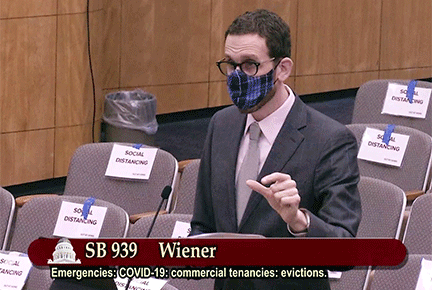On Friday, a bill that prohibits commercial landlords from evicting businesses and non-profits during the COVID-19 State of Emergency passed out of committee.
The bill moved through the Senate Judiciary Committee in a 5-1 vote with Senator Brian Jones (R-Santee) being the dissenting vote. Senators Maria Durazo (D-Los Angeles), Lena Gonzalez (D-Long Beach), Hannah-Beth Jackson (D-Santa Barbara), Bill Monning (D-Carmel), and Bob Wieckowski (D-Fremont) all supported the bill.
As amended, SB 939 places a moratorium on commercial evictions of small businesses and nonprofits for the duration of the COVID-19 health emergency.
The new amendments give businesses like bars, restaurants, and cafes the ability to renegotiate a lease if they have lost over 40% of their revenue due to COVID-19 restrictions and if they will operate at reduced capacity due to social distancing requirements. If the landlord and tenant cannot come to a new lease agreement within a period of 30-days, the tenant may terminate the lease with no penalty.
SB 939 will allow small business and commercial landlords to modify leases to recognize the new economic reality created by COVID-19. With businesses able to terminate their economically non-viable leases — rather than abandoning the lease, getting sued, and the owner being forced into bankruptcy — landlords will have greater incentive to negotiate an amicable resolution.
According to the bill, SB 939’s lease renegotiation provisions will not apply to publicly owned companies, or businesses owned by publicly owned entities. Instead, these amendments are designed to help small businesses and nonprofits in need of immediate relief.
SB 939, if passed, would — by statute — protect all California businesses and nonprofits from eviction, even if a city has not or is not able to take action.
According to the bill, it would be in effect until the end of 2021, or two months after the state of emergency ends, whichever is later. This bill was introduced by Senator Scott Wiener and Lena Gonzalez.
According to the Legislative Digest (as amended)
By adding a new crime, this bill would impose a state-mandated local program.
The California Constitution requires the state to reimburse local agencies and school districts for certain costs mandated by the state. Statutory provisions establish procedures for making that reimbursement.
This bill would provide that no reimbursement is required by this act for a specified reason.

